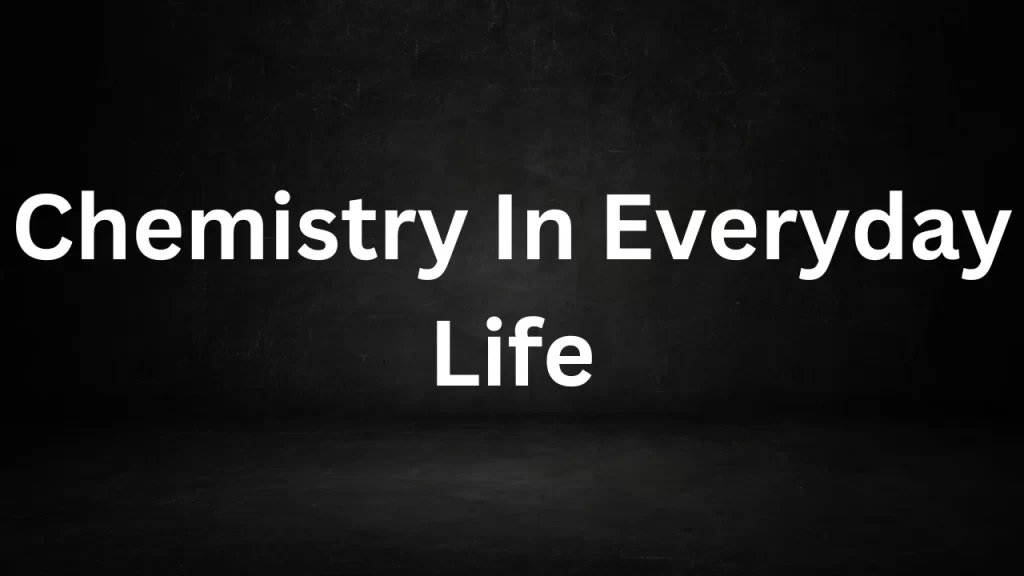Chemistry in everyday life: Chemistry is not confined to laboratory experiments and chemical equations; it is an integral part of our everyday lives.

Chemistry In Everyday Life
Medicine and Healthcare: Chemistry plays a pivotal role in the development of pharmaceuticals and medical treatments. From pain relievers to antibiotics, chemistry enables the creation of life-saving drugs that combat diseases and alleviate suffering.
Food and Nutrition: Chemistry helps us understand the composition of the food we consume. It involves processes like cooking, baking, and fermentation, which transform raw ingredients into flavorful and nutritious meals.
Cleaning and Hygiene: Household cleaning products, detergents, and disinfectants are formulated using chemical principles. They aid in maintaining cleanliness and preventing the spread of infections.
Cosmetics and Personal Care: Chemistry is behind the creation of cosmetics, shampoos, soaps, and skincare products. These items enhance our appearance and personal hygiene.
Environmental Protection: Understanding chemical processes in the environment is essential for addressing pollution, climate change, and conservation. Chemistry contributes to cleaner energy sources and sustainable technologies.
Water Purification: Chemical processes purify water, making it safe for drinking and everyday use. This is a critical aspect of public health.
Textiles and Apparel: Chemistry plays a role in fabric dyeing, textile manufacturing, and the creation of wrinkle-resistant and stain-repellent clothing.
Transportation: Chemistry is crucial in the development of fuels, lubricants, and materials used in transportation, making vehicles more efficient and eco-friendly.
Plastics and Packaging: Chemistry is responsible for producing versatile and lightweight materials like plastics, which are used in countless everyday items and packaging.
Electronics: Advances in materials science and semiconductor chemistry drive the development of electronic devices, making them smaller, faster, and more energy-efficient.
Agriculture and Food Production: Chemical fertilizers, pesticides, and herbicides boost crop yields and safeguard crops from pests and diseases. Soil chemistry and nutrient uptake are also areas where chemistry is vital.
Cooking and Baking: Everyday culinary activities involve chemical reactions like caramelization, Maillard reactions, and leavening, contributing to the delicious flavors and textures of our meals.
Energy Generation: Chemistry is central to energy production through processes such as combustion, nuclear reactions, and renewable energy technologies.
Aesthetics and Fragrances: Chemistry plays a significant role in creating fragrances, scents, and colors used in perfumes, cosmetics, and art.
Healthcare Diagnostics: Chemistry-based diagnostic tests, including blood tests and urinalysis, help healthcare professionals diagnose and monitor various medical conditions.
In summary, chemistry surrounds us and enriches our daily existence in countless ways. Its contributions to medicine, food, hygiene, the environment, and technology are evident throughout our lives, making it a vital and fascinating field of study and application.
Read More
- Energy Stored In A Capacitor
- Compound Lenses Thin Lenses In Contact
- 12th Class English Book Question Answer Pdf Download
Frequently Asked Question (FAQs) Chemistry In Everyday Life
1. What is the significance of chemistry in our daily lives?
Chemistry is essential in our daily lives because it helps us understand and improve various aspects of life, including health, nutrition, hygiene, energy production, and environmental conservation.
2. How does chemistry impact our health?
Chemistry plays a crucial role in healthcare by enabling the development of pharmaceuticals, diagnostics, and medical treatments that improve our well-being and combat diseases.
3. What are some common examples of chemical reactions in cooking and baking?
Common chemical reactions in cooking and baking include caramelization, the Maillard reaction (responsible for browning), and the leavening of dough in baking.
4. How does chemistry contribute to the food we eat?
Chemistry helps us understand food composition, preservation techniques, and flavor development. It’s involved in processes like fermentation, pasteurization, and food additives.
5. What are some environmentally significant applications of chemistry?
Chemistry helps address environmental challenges by contributing to clean energy technologies, waste management, and pollution control. It also aids in understanding climate change.
